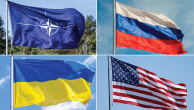Across the broader set of 25 countries surveyed, attitudes toward Russia are mostly negative. Overall, a median of 79% have an unfavorable view of Russia, while a median of 19% have a positive view.
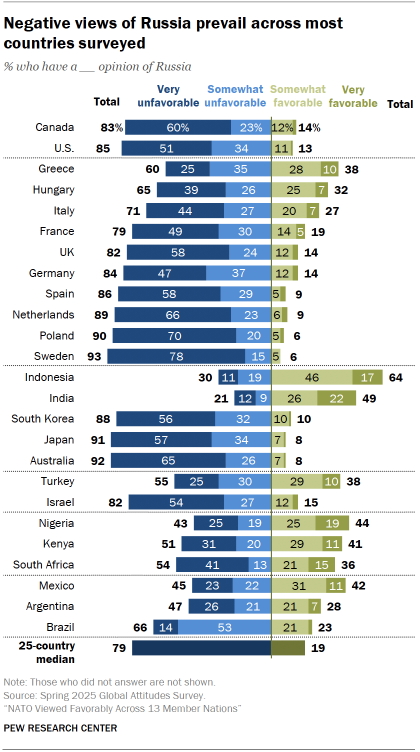
Majorities of adults in 18 of the countries surveyed have an unfavorable view of Russia. And in many of these countries, the predominant attitude toward Russia is very unfavorable: 78% in Sweden, 70% in Poland, 66% in the Netherlands and 65% in Australia describe their view this way.
Of the publics surveyed, Indonesians are the most positive toward Russia: 64% have a favorable view. Opinions in India are also positive, on balance (49% favorable vs. 21% unfavorable), though many Indians (31%) do not express an opinion. In no other country surveyed are opinions about Russia more positive than negative.
Views of Russia vs. views of U.S.
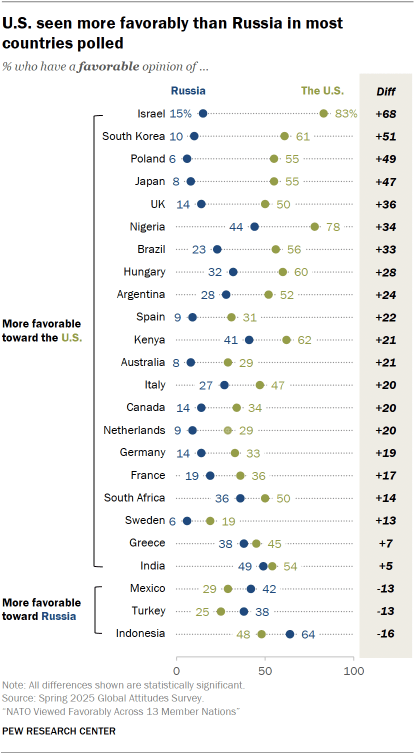
In 21 of the countries surveyed (excluding the U.S.) people have a more positive view of the U.S. than Russia. This is the case even though America’s image has fallen sharply over the past year in many nations.
Only in Indonesia, Mexico and Turkey do more people have a favorable opinion of Russia than of the U.S.
Related: U.S. Image Declines in Many Nations Amid Low Confidence in Trump
Views over time
Opinions of Russia have, in general, shifted very little in the past few years, following a worsening in international public opinion after Russia’s 2022 invasion of Ukraine.
But favorable views are up since last year in Greece, Hungary, Italy, Poland and Turkey. In South Korea, favorable views of Russia have declined 9 points.
By age, ideology and right-wing populist party support
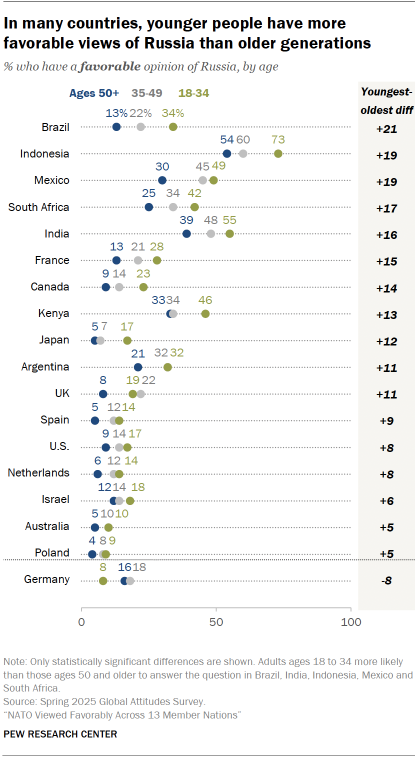
There are some differences in views of Russia by age. In 17 countries surveyed, adults ages 18 to 34 have more favorable opinions of Russia than adults ages 50 and older.
In eight countries, people who place themselves on the ideological right are more favorable toward Russia than those on the left. For example, in Hungary, 41% of people on the right have a favorable view, compared with 20% of those on the left.
Similarly, many people who support right-wing populist parties in Europe have more favorable opinions of Russia than those with unfavorable views of these parties.
For more on U.S. views of Russia by party, read “Republican Opinion Shifts on Russia-Ukraine War.”
Confidence in Putin
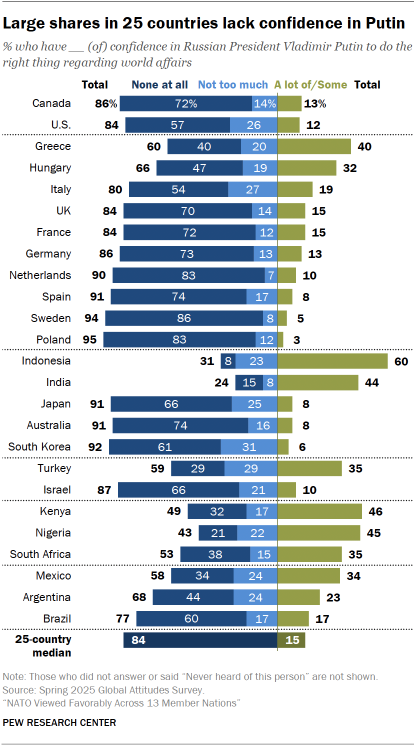
Confidence in Russian President Vladimir Putin is low across the 25 surveyed countries. A median of 84% of adults say they have not too much or no confidence at all in Putin to do the right thing regarding world affairs, while a median of 15% express at least some confidence in him.
Europeans’ opinions of Putin are especially critical. Substantial majorities in every European country surveyed lack confidence in the Russian president, including majorities of 90% or more in the Netherlands, Poland, Spain and Sweden. In several European countries, half or more say they have no confidence at all in Putin. Across the region, no more than four-in-ten express confidence in him.
Views are more varied in other parts of the globe. In the Asia-Pacific region, for instance, 60% of Indonesians have at least some confidence in Putin to do the right thing regarding world affairs. But in Australia, Japan and South Korea, fewer than one-in-ten adults hold this view.
Of the sub-Saharan African publics surveyed, Kenyans and Nigerians are divided in their views of Putin, while South Africans are more critical. And in Latin America, Mexicans are the most confident in the Russian president, but they rate him more negatively than positively (34% confident vs. 58% not confident).
In the Middle East, majorities of people in Israel (87%) and Turkey (59%) lack confidence in Putin.
Views over time
Confidence in Putin has remained low in most countries since Russia’s 2022 invasion of Ukraine, though opinion has improved slightly in some countries. For example, in Mexico, confidence in Putin is up by 10 points since last year. And in Hungary, roughly a third (32%) now have at least some confidence in him, up from 23% last year. Confidence in Putin is also up in Italy (+7 points), Greece (+6), Turkey (+6) and the U.S. (+4).
In some countries, the uptick in overall confidence in Putin is at least partly driven by growing confidence among those who place themselves on the ideological right. For example, 28% of Italians on ideological right now express at least some confidence in Putin, up from 15% last year.
By ideology
In many countries where we ask about ideology, people on the right are especially likely to express confidence in Putin to do the right thing regarding world affairs. This is especially evident in Hungary, where 43% of those on right say they have confidence in Putin, compared with 20% of those on the left and 27% of those in the center. A similar pattern can be observed in Australia, Canada, Germany, Italy, the Netherlands, Nigeria, Spain, the UK and the U.S.
In Israel and Mexico, this pattern is reversed, with people on the ideological left more likely than those on the right to have confidence in Putin. For example, 27% of left-leaning Israelis have at least some confidence in him, compared with 4% of those on the right.
By right-wing populist party support
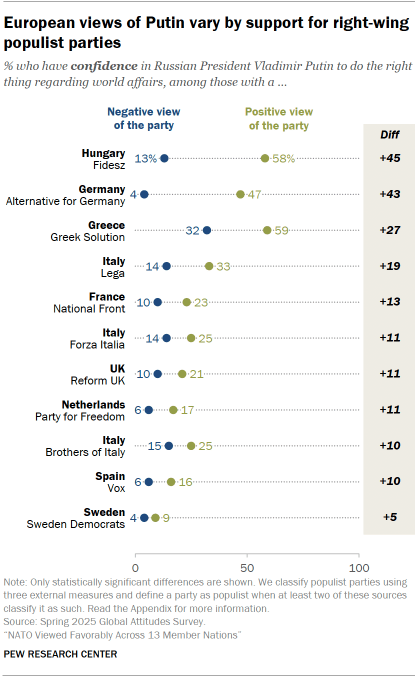
Among Europeans, those with a favorable view of right-wing populist parties in their country tend to be more confident in Putin. In Hungary, for instance, more than half of adults who support Fidesz – the party led by Prime Minister Viktor Orbán – have confidence in Putin to do the right thing regarding world affairs (58%). This compares with 13% of Hungarians who do not support Fidesz.
In Italy, right-wing populist party supporters have grown more confident in the Russian president since last year. Today, a third of Lega supporters express confidence in Putin, up from 11% in 2024 (+22 points). There have been a similar increases among supporters of Forza Italia and Brothers of Italy.
